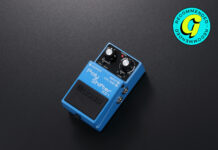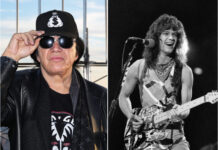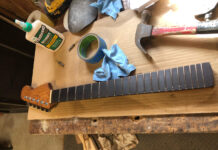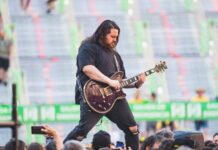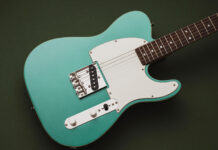
“My uncle got me into one of Stevie Ray Vaughan’s last shows” Spoon’s Britt Daniel on Texas blues, Telecasters and three decades in music
“I like the way my pick sounds when it scrapes across the strings of a Fender,” says Spoon main man Britt Daniel with placid, understated affection. “I don’t get that with any other guitar.” The Texan guitarist is better placed than most to make such an assessment – the son of a prolific collector, with his own sizeable arsenal now including the Britt Daniel Signature Thinline, he’s played ‘a few’ Telecasters in his time.
“Those single-coil pickups have a way of expressing rhythm I don’t get anywhere else,” he continues, warming to the theme. “I did play ES-335s for a while, in fact it was my main guitar for a few years, but I came back to Fender.”
More of that later. Since forming Spoon in 1993, Daniel’s made ‘a few’ pretty good records too, a topic we’re here to discuss on a sedate LA morning. Following the release of Everything Hits At Once last year, the band are reissuing their first eight albums through indie label Matador. That’s a lot of music, and Daniel is taking time to reflect on that back catalogue when we catch up with him on a break from working on their 10th LP.
“When we did the greatest hits, I listened to all those records, one after another,” he says. “I hadn’t listened to them straight-on for years. It was a bit of a revelation to see how the band developed and get a glimpse of what I, at that age, was like. On the first album, I was trying to rip off Will Sergeant in Echo & The Bunnymen, lots of reverb, powerful, moody guitar lines…”
The reissue series serves as a neat overview of the band’s journey, from those early days on Matador to their less than harmonious time with major label Elektra, and the celebrated early-2000s run of albums for Merge: Girls Can Tell, Kill The Moonlight and Gimme Fiction. Along the way, Spoon have sold more than a million records.
“A big moment was getting a label who wanted to put out our first album,” says Daniel. “There were a few labels interested, most of them majors, but we liked Matador and their way of approaching business. I kept buying records and not really thinking about what label the bands were on, then I’d turn over the record and see the Matador label – Yo La Tengo, Pavement, Guided By Voices, Liz Phair… When they wanted to put out our record, that felt momentous.
“With Merge, it was a good run. We did five records pretty fast. When Girls Can Tell started that run, we didn’t have a label, but by the end of the run we were a Top 5 band in the album charts in the States.”
Image: Anna Webber / WireImageTexas flood
Daniel’s guitar adventure began early, growing up in Temple, Texas, an hour north of Austin and influenced by his father, a Stones and Beatles fan with, Daniel remembers, “a lot of guitars, a huge closet, just stacked up in there”. “Pretty much from birth, I saw he was always playing an acoustic guitar,” adds Daniel, whose first instrument was a Peavey bass before progressing to an acoustic borrowed from a friend, which he thinks may have been a Gibson Hummingbird.
“My first electric was a Hondo Les Paul imitation, which was not very good. My first guitar that really worked for me was an Alvarez electro-acoustic that I’d play distorted through an amp, and I played that at Spoon shows for the first five years. I still have it, strung Nashville tuning style.”
Austin’s rich music heritage had a potent effect on Daniel, who formed his first band The Zygotes at high school, before making a pair of early-90s albums with Skellington. Yet it wasn’t legendary Texan country and blues players who caught his ear as a teenager.
Image: Scott Dudelson / Getty Images“Me and my friends could pile in someone’s car, and in an hour and a half be in Austin. At that age, I wasn’t really into what Austin was known for, but it had a bit of an underground… there’s always been the Big Boys, Butthole Surfers, The 13th Floor Elevators… it was pretty significant to my development that Austin was so close. My uncle got me into this show, one of Stevie Ray Vaughan’s last shows, so I did get to see that. I wasn’t really into blues, but it blew me away what that guy could do.”
Equally pivotal was meeting drummer Jim Eno, with whom Daniel played in The Alien Beats, before in 1993 forming Spoon, named after a Can song, with guitarist Greg Wilson, aka Wendel Stivers, and bass player Andy McGuire. “Greg was a great guitar player. He seemed like he was the only guy in town who played like the electric players I liked – Mick Ronson, Joey Santiago… so I snagged him.
“When we started out, our biggest ambition was to get weekend gigs. It was easy to get week-night gigs, but to play in front of more people at the weekend when you might earn a few bucks, that was the driver. Eventually, it became about making records…”
Those records quickly began to pile up. Tracing the band’s sonic evolution through 10 wholly distinct studio albums, Daniel’s guitar preferences have diverged, too. From 1996’s serrated, Pixies-influenced Telephono to a trio of Top 10 albums – Ga Ga Ga Ga Ga (2007), Transference (2010) and They Want My Soul (2014) – before 2017’s keyboard-heavy Hot Thoughts, Daniel started out with the Alvarez and added a 1964 Gibson ES-335. It wasn’t long before Teles came calling, though.
“The Alvarez into a solid state Fender, that was the sound of our first record,” Daniel remembers. “There was a 1960s rust-coloured ES-335 I used in the mid-2000s, Ga Ga Ga Ga Ga, some of Transference… Then I used my Custom Shop Thinline for most of They Want My Soul. I’ve got a black 1930s Gibson L-00 that I’ve used for most of the acoustic songs in the last 10 years. Somehow it’s held together… I’ve gotten lucky five or six times when I’ve just bought a guitar off eBay because of the way it looks and I have a good feeling about it, and that was one of those, it’s amazing.
“The last record was the Thinline again, and the new single, last summer [No Bullets Spent], that was the signature guitar, its first appearance. I started playing Thinlines because they sound a little different from a regular Tele, but I was also drawn to them for the look – the F-holes, it’s almost like a fiddle, and they’re extremely light, so I can throw it all over the place, sling it on my back… they’re great for a live show.”
All of the above is true of the Fender Britt Daniel Signature Telecaster Thinline, a picture of timeless simplicity with its lightweight Ash body, Amarillo Gold finish, deep C-profile neck, S1 switch and Custom Shop Texas Special neck pickup. The guitar’s development took over a year, with numerous prototypes arriving at Daniel’s door. There are, he acknowledges, worse ways to spend your time.
Image: Michael Loccisano / Getty Images for SXSW“I was talking to someone at my management company, and they said, ‘Fender want to know if you’re interested in making a guitar’. It was kind of a no-brainer, I couldn’t believe it. One of the first things I did was call my dad, I couldn’t think of anyone who’d be more excited than him. I went to Fender in LA and we talked about the kind of guitar I wanted to make. We decided to combine elements from two different Thinlines I’d been playing for a long time.
“With each prototype, we’d hone a little bit more on the colour, the tuning pegs, the bridge… we went through all those details and it took over a year, but it was not a process I minded at all. I wanted pickups that were hotter, more gain, more 50s-sounding, more pokey EQ, more twang. Fender put different pickups on each prototype. They’d send a prototype and I’d say, ‘I want it hotter’. Eventually we got it.”
Vox populi
Daniel also has a long-standing love of Vox AC30s. We suggest that his guitar’s mid-forward Texas Special into an AC30 must be, to put it mildly, a somewhat ‘present’ sound. “It’ll cut your head off!” he says, laughing. “I’ve been recording a lot of the new record on a Vox Pathfinder. It’s a tiny amp that cost $120, but it’s got a good sound. Whenever we play live again, I’ll be playing through a unique head that my old touring tech Matt Gilchrist made for me, it’s much like an AC30. We had this issue where we’d do a fly-in show and would have to rent an AC30. Some of them were Chinese-made, some were too hot, distorted. He made me the head so I could take it on the flight with me and plug it into AC30 speakers wherever I go.”
Despite his enduring love of Teles, when confronted with the classic ‘burning building’ question, Daniel doesn’t initially plump for a Fender. “I just got a red Gibson B-25 from the 60s that I’m pretty psyched about,” he says. “If I could only grab one guitar, it would probably be that. It sounds and looks beautiful. It’s more of a strummer than an acoustic that you want to be picking on, it’s got the thinner neck and a beautiful strum.
Image: Michael Loccisano / Getty Images for SXSW“If it was a Tele, it’d have to be my signature, right? Although if I called Fender and told them my house burnt down, they’d probably give me another BD… so I’d have to pick something rarer, probably the 90s Custom Shop Thinline, the first Thinline I got.”
With such discerning guitar tastes, it comes as no surprise to learn there are some boutique choices on Daniel’s pedalboard, too. He’s the proud owner of a Klon Centaur and absolutely does “believe the hype”, pairing the genuine article with a Klon clone, alongside a 90s Electro-Harmonix Deluxe Memory Man, a 1970s Boss CE-1 Chorus Ensemble that’s “like a tank, a huge chunk of metal”, an EHX Holy Grail reverb and a Boss TR-2 tremolo.
“They’re pretty great. I became friends with Bill Finnegan who made them, he’s a real character. When I first met him, he was selling those things for $350, and how much are they now? They have a really special sound, for sure. I use the Klon for the main sound and the clone for an extra boost. There are super-subtle differences in the top-end, but the clone is pretty good.”
No doubt some of those Thinlines and the Klon will be all over the new Spoon album, which Daniel estimates was 75 per cent complete when COVID-19 intervened. Since then, he’s written more songs, and he and Eno have reconvened at the drummer’s studio, Public Hi-Fi. After the keyboard-dominated Hot Thoughts, will this be more of a guitar album?
“I think we’re kind of reacting against that,” Daniel confirms. “It’s more of a guitar record, less of a produced record and more of a played record; more about the sound of the band than a band making a very produced record. It’s a little less pieced together and more live. We were recording up until 10 March, then 11 March was the day lockdown kicked into overdrive. The whole band hasn’t been together since that day. We were about 75 per cent done, but I’ve written a few more songs and we’ve got to get those on the record. Maybe now we’re at 50 per cent.”
Rarely for a band who’ve spent 27 years on the road, Spoon still love touring. Best-of collections and reissue campaigns must surely provoke a desire to play those songs live. Before wrapping up our call, Daniel articulates a yearning for a return to normality that’s entirely relatable. “I do miss that life,” he says with a sigh. “In Austin, I go out to shows three or four nights a week. I just dig it, the whole thing about gigging and meeting people at gigs.
“Some of my friends and people whose music I love, they don’t like touring, but you’ve got to find a way to have fun with it. The music, those gigs and that celebration you can have every night. I miss it a lot.”
For more artist interviews click here.
The post “My uncle got me into one of Stevie Ray Vaughan’s last shows” Spoon’s Britt Daniel on Texas blues, Telecasters and three decades in music appeared first on Guitar.com | All Things Guitar.
Source: www.guitar-bass.net

